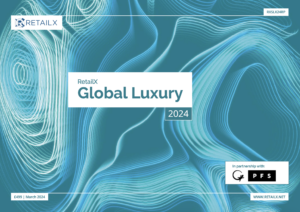While luxury is entrenched in physical retail, it is not averse to technology and has increasingly relied on the role of social media and influencers to drive sales, the RetailX Global Luxury 2024 report has found.
Social media is an important marketing channel for all retailers, but how luxury brands use it differs to some degree from other types of retail. For many, luxury is a considered, lifestyle purchase and so social media use relies on selling this lifestyle idea, rather than actually selling the goods themselves. It bridges the gap between reality and the fantasy of a higher social status and a better life.
As a result, social is very popular among luxury shoppers. According to data, 85% of luxury consumers use social media, with most using an average of three platforms. For luxury brands, they each offer different ways to reach an audience.
Instagram is great for sharing user-generated content and influencer marketing. Facebook has massive reach and powerful segmentation, so can reach specific users. YouTube is great for both influencer and corporate promos, while Pinterest is content rich and can also lead directly to sales.
Luxury in the metaverse
Several luxury brands have been pioneers of using the metaverse as both a marketing and a sales channel for a number of years. While general retail interest in the metaverse has waned, many of these brands have continued to use the virtual world to market and to sell.
In fact, combined these brands have created a whole new revenue stream using the metaverse selling digital items – non-fungible tokens (NFTs) – to be worn and used by users avatars. This netted brands in the metaverse some $4.7bn in 2023, a substantial additional revenue stream.
The likes of Balenciaga launching capsule NFT wardrobes in metaverse games such as Fortnite has also seen luxury embrace gaming as a channel to market. This is part of a wider retail market move towards creating retail media networks (RMNs) and building on brands such as Gucci exploring selling its NFTs in Roblox, another well-used metaverse game.
At the same time, Louis Vuitton has launched its own mobile-based metaverse game – Louis the Game – extending its brand reach into this immersive, digital world.
The upshot of this is that many of these luxury brands have managed not only to create a unique and new digital presence, but are doing a very good job of targeting a younger demographic of users, bringing many Gen Alpha shoppers – those born since 2010 – into the luxury fold. This not only bolsters sales for these brands in the here and now, but also goes some way towards future-proofing luxury businesses that have until now relied on a much older and more traditional set of consumers.
This is an except from the RetailX Global Luxury Report 2024, authored by Paul Skeldon. Download the full report for a look at consumer behaviour, the channels and devices used to make purchases, sustainability, predictions of consumer change and 22 in-depth company case studies.
This report aims to give senior retailers both insight of a market worth $354.81bn as well as details on how the major players are reacting to economic forces and are using technology and customer experience to differentiate their products and increase sales.
Stay informed
Our editor carefully curates two newsletters a week filled with up-to-date news, analysis and research, click here to subscribe to the FREE newsletter sent straight to your inbox and why not follow us on LinkedIn to receive the latest updates on our research and analysis.










